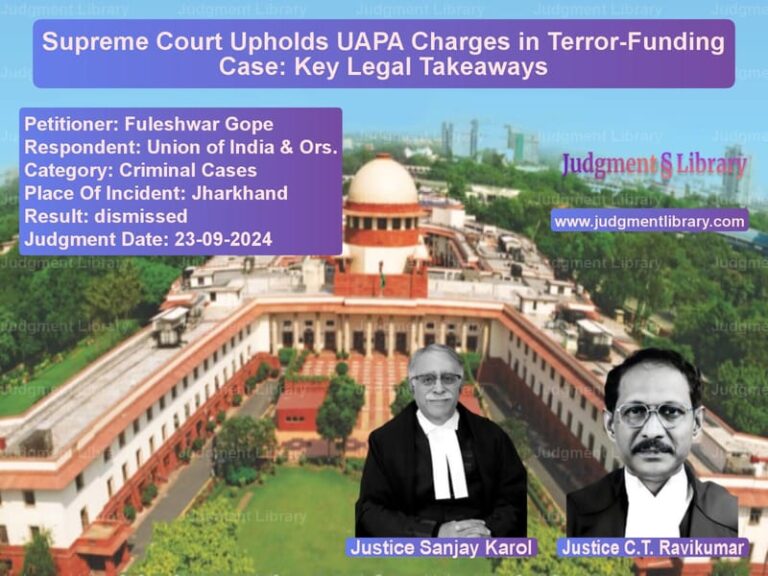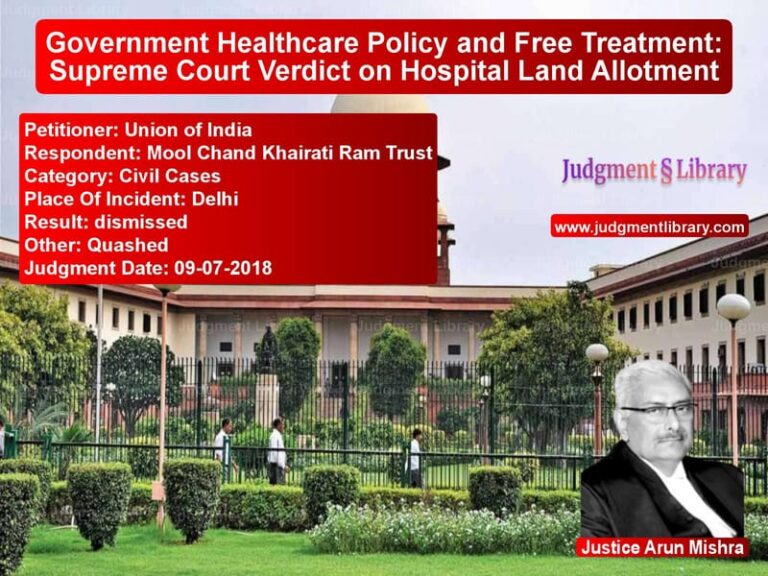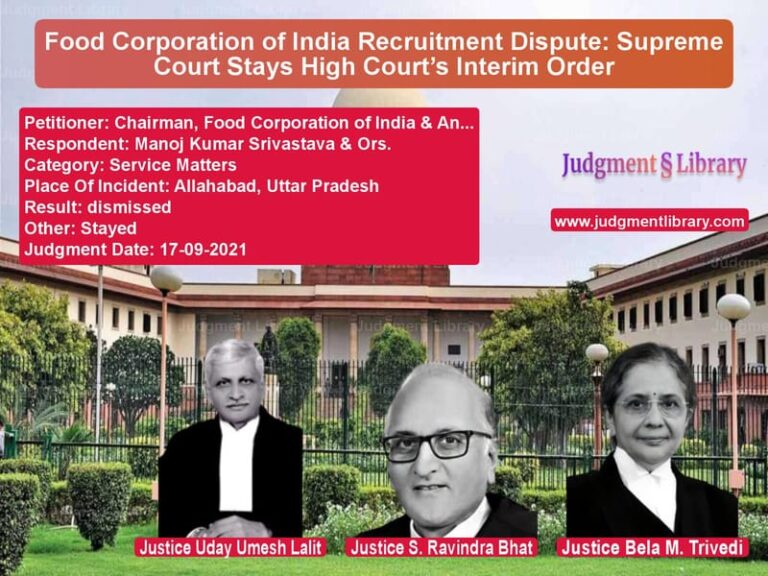Supreme Court Quashes Criminal Case Against Officer Accused of Abetment to Suicide
The Supreme Court of India recently quashed the criminal case against a government officer accused of abetting the suicide of a subordinate employee. The case, Prabhat Kumar Mishra vs. The State of Uttar Pradesh & Another, revolved around the interpretation of abetment under Section 306 of the Indian Penal Code (IPC) and the application of the Scheduled Castes and Scheduled Tribes (Prevention of Atrocities) Act, 1989 (SC/ST Act).
The Court ruled that mere work-related pressure and dissatisfaction with superiors’ conduct do not amount to abetment to suicide unless there is clear instigation or a direct act leading to suicide. The ruling reinforces the principle that criminal liability for abetment requires a clear mens rea (criminal intent) and a direct role in inciting the act.
Background of the Case
The case arose from the suicide of Data Ram, a Senior Clerk at the Child Welfare Board, Fatehgarh, Uttar Pradesh, who took his own life on October 3, 2002, by consuming poison at his home. A suicide note was found, wherein he mentioned alleged harassment by his superiors, including Prabhat Kumar Mishra, who was then the District Savings Officer in Kannauj.
Criminal Proceedings
Filing of the FIR
- Following the discovery of the suicide note, FIR No. 249/2002 was registered at Police Station Kotwali, Fatehgarh.
- The FIR charged Mishra under Section 306 IPC (abetment to suicide) and Section 3(2)(v) of the SC/ST Act.
- Initially, the investigating agency filed a closure report, stating that no case was made out.
- However, the investigation was later reopened, and a charge sheet was filed against Mishra.
High Court Proceedings
- Mishra moved the Allahabad High Court under Section 482 CrPC, seeking quashing of the criminal case.
- The High Court rejected the plea on July 26, 2022, holding that the suicide note indicated harassment sufficient to constitute abetment.
Supreme Court Appeal
- Mishra appealed to the Supreme Court, arguing that the allegations in the suicide note did not amount to abetment.
- The Court granted leave and examined whether the charge sheet and criminal proceedings met the legal criteria for abetment to suicide.
Key Legal Issues Considered
1. Whether the Allegations Constituted Abetment to Suicide
- The suicide note mentioned that Mishra and another superior officer had called Data Ram to Kannauj and reprimanded him for delays in pension distribution.
- Data Ram wrote that he was feeling helpless due to work pressure and humiliation but did not allege any direct instigation or provocation to end his life.
- The Supreme Court ruled that mere administrative pressure or reprimand does not amount to abetment unless there is clear incitement or coercion leading to suicide.
2. Application of Section 3(2)(v) of the SC/ST Act
- For an offense to fall under this provision, the crime must be committed against the victim on account of their caste.
- The Court found no evidence that Data Ram was harassed due to his Scheduled Caste status.
- It ruled that the prosecution under the SC/ST Act was misplaced and without legal basis.
Supreme Court’s Key Observations
1. No Evidence of Abetment Under Section 306 IPC
The Court emphasized that abetment requires a positive act of instigation or assistance in committing suicide.
“The contents of the suicide note do not in any way make out the offense against the appellant. Mere work-related pressure or a reprimand from a superior cannot be considered abetment unless there is clear provocation or coercion.”
2. No Caste-Based Discrimination to Attract SC/ST Act
The Court reiterated that the SC/ST Act is applicable only when an offense is committed because of the victim’s caste status.
“There is no material to suggest that the alleged offense was committed against the deceased on the ground that he belonged to a Scheduled Caste.”
3. Legal Precedents on Abetment to Suicide
The Court cited past judgments, including:
- Netai Dutta v. State of West Bengal (2005) 2 SCC 659: Held that a mere mention of someone’s name in a suicide note does not establish abetment.
- M. Mohan v. State (2011) 3 SCC 626: Stressed that a direct act of incitement is required to prove abetment.
- Masumsha Hasanasha Musalman v. State of Maharashtra (2000) 3 SCC 557: Clarified that the SC/ST Act applies only when the crime is committed due to caste discrimination.
Final Verdict
The Supreme Court allowed the appeal and quashed the criminal case against Prabhat Kumar Mishra.
“The prosecution of the appellant for offenses under Section 306 IPC and Section 3(2)(v) of the SC/ST Act is grossly illegal and amounts to an abuse of process of law.”
Conclusion
The Supreme Court’s ruling in this case reinforces the need for a high threshold of proof in abetment to suicide cases. It ensures that:
- Workplace pressures or reprimands are not misconstrued as abetment.
- Criminal liability for abetment is imposed only when there is clear intent to incite suicide.
- The SC/ST Act is applied only when caste-based discrimination is explicitly evident.
The ruling serves as a safeguard against the misuse of criminal laws and ensures that prosecution under Section 306 IPC and the SC/ST Act is grounded in clear, provable intent rather than assumptions based on workplace conflicts.
Read also: https://judgmentlibrary.com/supreme-court-rejects-juvenility-claim-in-1982-murder-conviction/
Petitioner Name: Prabhat Kumar Mishra.Respondent Name: The State of Uttar Pradesh & Another.Judgment By: Justice B.R. Gavai, Justice Sandeep Mehta.Place Of Incident: Farrukhabad, Uttar Pradesh.Judgment Date: 05-03-2024.
Don’t miss out on the full details! Download the complete judgment in PDF format below and gain valuable insights instantly!
Download Judgment: prabhat-kumar-mishra-vs-the-state-of-uttar-p-supreme-court-of-india-judgment-dated-05-03-2024.pdf
Directly Download Judgment: Directly download this Judgment
See all petitions in SC/ST Act Case
See all petitions in Suicide Cases
See all petitions in Judgment by B R Gavai
See all petitions in Judgment by Sandeep Mehta
See all petitions in allowed
See all petitions in Quashed
See all petitions in supreme court of India judgments March 2024
See all petitions in 2024 judgments
See all posts in Criminal Cases Category
See all allowed petitions in Criminal Cases Category
See all Dismissed petitions in Criminal Cases Category
See all partially allowed petitions in Criminal Cases Category







